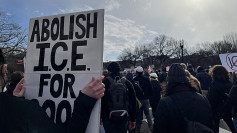President Donald Trump reinstated U.S. participation in two international anti-abortion pacts Friday, reviving divisive policies that limit federal funds for organizations supporting abortion and renewing debates on women's healthcare access globally.
On Friday, President Trump utilized his executive authority to reinstate U.S. involvement in two worldwide anti-abortion accords. One of these accords sanctions foreign organizations that provide or advocate abortion with a cutoff of U.S. family planning funding.
Opponents of abortion claim that Trump's decision to reintroduce the Mexico City Policy amounts to a "global gag order" that stifles free speech. Former President Ronald Reagan instituted it in 1984; every Democratic president since then has repealed it, and every Republican president has restored it.
In the 2024 presidential campaign that Trump won, abortion was a key issue, and it continues to be a contentious one in American politics. Each of the fifty states now has the authority to determine its own abortion policy, after the United States Supreme Court struck down a federal right to abortion in 2022.
In a memorandum dated Friday, Trump instructed Secretary of State Marco Rubio to carry out the Mexico City Policy, which prohibits the use of U.S. taxpayer funds to organizations or programs that engage in the coercion of abortion or involuntary sterilization in various ways.
Those in favor of abortion rights and Democrats argue that the regulation prevents foreign nongovernmental organizations (NGOs) from obtaining U.S. funding, regardless of whether they spend it on abortion care or not.
Research shows that the "gag order" has led to an increase in unintended pregnancies and abortions, contrary to its intended consequence, according to Janeen Madan Keller, a policy fellow at the Center for Global Development.
For the most part, these actions will make it harder for girls and women to finish high school and join the workforce, which will slow down the United States' progress toward gender equality, according to Madan Keller.
On Friday, Rubio also made the announcement that the US would be rejoining the Geneva Consensus Declaration. Opponents of the declaration claim it seeks to restrict abortion access for millions of women and girls globally.
In 2020, during Trump's first term in office, the following countries-Indonesia, Brazil, Uganda, Egypt, Hungary, and Egypt-co-sponsored the proclamation. More than 35 people have signed it thus far.
In its original form, the proclamation aimed to improve women's healthcare, safeguard human life, reinforce the family as society's fundamental unit, and safeguard the sovereignty of each nation, according to the previous Trump administration.
According to Friday's statement from the State Department, "protect life at all stages" was one of the four goals of the accord.
In addition to rescinding two executive orders that Joe Biden had issued to maintain access to reproductive health services following the Supreme Court's decision to overturn Roe v. Wade, Trump has issued an executive order pertaining to the Hyde Amendment, which forbids the use of federal funds to pay for abortion coverage in the US.
"While this EO (executive order) has no immediate impact, it is an indication of the Trump administration doubling down on denying abortion access to people with low incomes," stated Planned Parenthood, a healthcare provider for women.





